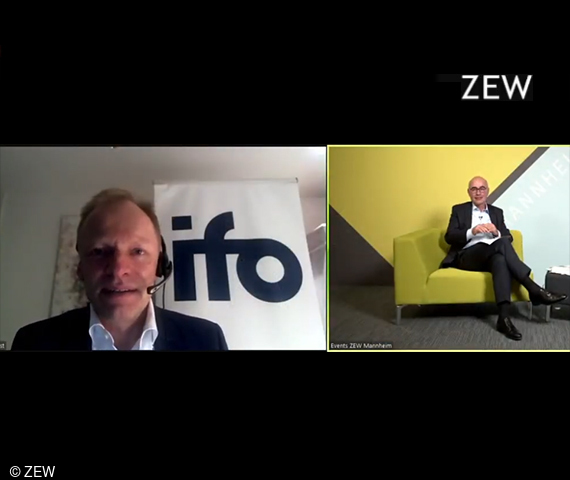“Neo-Dirigism Is Not the Answer to the COVID-19 Crisis”
Events#ZEWBookTalk with Clemens Fuest on How to Save the Economy in the Coronavirus Crisis
The coronavirus pandemic has put the economy, society and policymakers under considerable pressure. Against this background, ifo President Professor Clemens Fuest presented his recently published book “Wie wir unsere Wirtschaft retten. Der Weg aus der Corona-Krise” (“How to Save the Economy. The Way Out of the Coronavirus Crisis”) in an online event on 26 October 2020 at ZEW Mannheim – marking the kick-off of the new #ZEWBookTalk series. In the subsequent discussion with ZEW President Professor Achim Wambach, Fuest expressed his criticism of the German government’s current tendency towards interventionist economic policy measures. The difficulties in overcoming the coronavirus-induced recession lie in the fact that the measures adopted are not well-targeted and that there is not enough economic data on the regional impact of the crisis, he argued.
“Where do we currently stand in the COVID-19 recession?” asked Clemens Fuest at the beginning of his presentation. According to the ifo Institute, the business climate improved significantly in October 2020, cushioning the effects of the economic downturn caused by the coronavirus crisis. However, Germany is currently facing a massive second wave of infection. “While the German economy will not shrink as much as other European economies, there are currently no signs of recovery,” stressed the ifo president. The fall in consumption caused by adjustments in consumer behaviour and government intervention led to the underutilisation of businesses capacities. This, however, does not mean that Germany is facing a typical demand problem. “While there have been no major decreases in disposable income, private consumption has seen a sharp decline. This is firstly the result of shops closing down, and secondly because many people think that this is not the right time to go to the restaurant,” Fuest went on to explain.
Reliable data and the stimulus package can help overcome the crisis
After Fuest’s presentation, ZEW President Achim Wambach opened the discussion with the following question: “In your book, you identify acute shock, shutdown and economic recovery as the three stages of the coronavirus crisis. What phase are we currently in?” In October 2020, there were signs of an economic recovery. If the number of infections rises once again, the German economy will fall back into the shutdown phase, explained the ifo president. In the first phase of the coronavirus response, the government adopted liquidity measures and provided temporary assistance for businesses. In the second phase, it introduced the stimulus package. According to Fuest, it remains to be seen whether this package has provided relief. “So far, there have been few crises that required these kind of economic policy interventions. Given the nature of the coronavirus crisis, it is difficult to draw conclusions from crises like the Great Depression or the financial crisis of 2008. We currently lack data on the regional economic implications regarding, for instance, the equity and liquidity situation of businesses,” stated Fuest.
Agreeing with Fuest’s view, ZEW President Achim Wambach stressed: “There is just not enough robust data.” According to Clemens Fuest, we are currently paying the price for the fact that policymakers have failed to collect sufficient economic data in the past years. This has made it difficult to design the stimulus package. Moreover, the different federal states have heterogenous interests, and some sectors have been hit harder than others. “In my view, some stimulus measures like the reduction of the value added tax (VAT) have not been sufficiently targeted to adequately counter the effects of the crisis. Suppliers of products such as electric bikes or furniture, which are currently experiencing high demand anyway, are benefiting from the VAT reduction, while it fails to boost demand in the most affected sectors such as the tourism industry due to existing travel restrictions. It would have been more sensible to target the different sectors individually. All in all, however, I am satisfied with the adopted stimulus programme,” the economist explained during the live event in front of approximately 230 viewers.
Fuest takes a critical view of the European Green New Deal
“The EU insists on its goal of achieving carbon neutrality by 2050. Is this possible in light of the coronavirus crisis?” asked Achim Wambach, who moderated the discussion. The ifo president explained that he has long been critical of the Green New Deal. More specifically, he takes a negative view of the taxonomy used to classify financial products as sustainable. This will give the entire economy a more bureaucratic structure, which will in turn lead to a planned economy and channel capital into specific areas. These measures are no longer in keeping with the times, he argued. “It is always difficult to pursue environmental policy goals through economic policy measures. When it comes to the economy, it is difficult two solve two problems with one instrument. These issues require two separate approaches. Measures that place restrictions on competition should therefore not be justified on the grounds of sustainability,” concluded Fuest.
Taking on new debt is indispensable in the coronavirus crisis
As a last question, Achim Wambach asked: “Can Germany afford taking on new debt in the coronavirus pandemic?”, to which Clemens Fuest responded by asking if there are any alternatives to the stimulus programme. Studies indicate that countries that enter the crisis with high debt levels emerge from the crisis in a far worse position. Compared to other EU countries Germany has low debt levels. Refraining from adopting a stimulus package would cause a more severe economic collapse. However, it is also important to consider the demographic change, which will not go away any time soon, explained the ifo president. “In many cases, low debt goes hand in hand with weak economic performance. It is therefore crucial to take the appropriate measures to secure sound public finances. In the long term, we will need to keep the refinancing costs as low as possible,” said Fuest, concluding the event.
